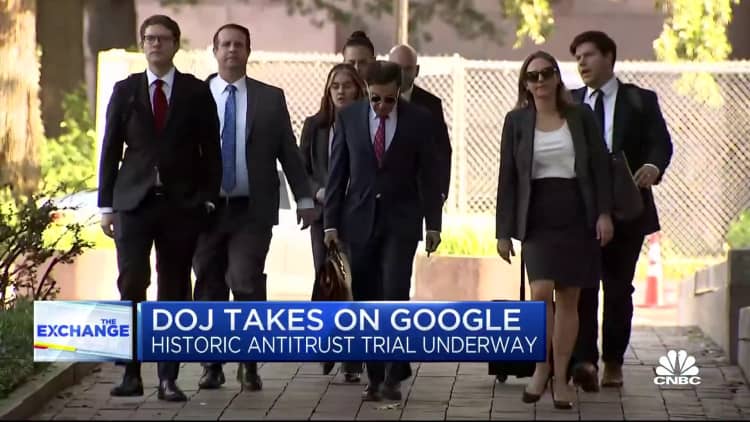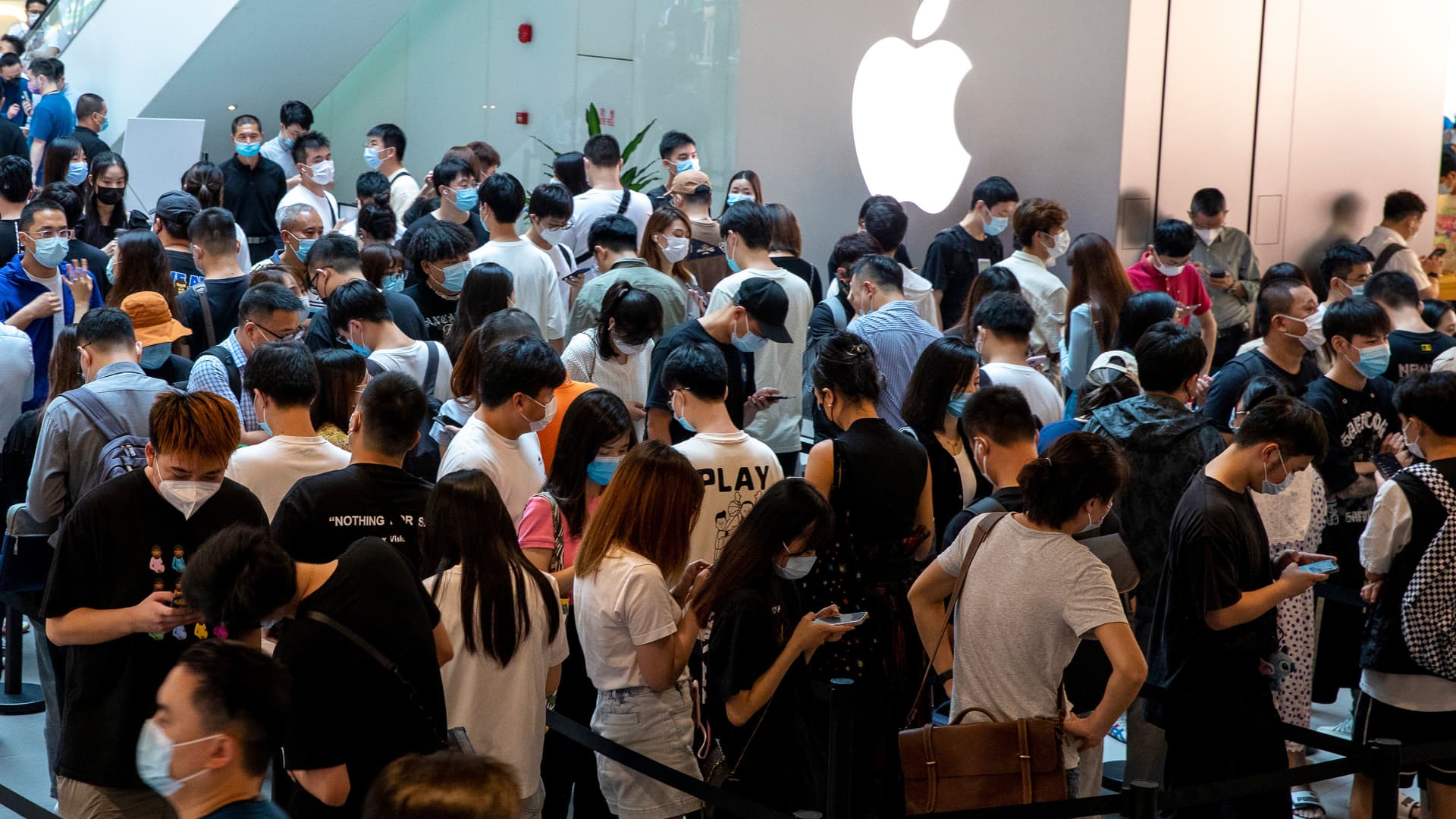What hapened the first day of the anti-monopoly trial

Jonathan Kanter, Assistant Attorney General for the Antitrust Division at the Department of Justice, arrives at federal court on September 12, 2023 in Washington, DC.
Kevin Dietsch | Getty Images
Google pays billions of dollars to make sure its search engine runs by default on internet browsers and phones, feeding a cycle that pumps its own monopoly profits while making it harder for rivals to gain significant market share in search, the government alleged in opening arguments Tuesday at the biggest tech antitrust trial in decades.
Lawyers for the Department of Justice and a coalition of state attorneys general led by Colorado faced Google on Tuesday, as the 10-week trial kicked off in Washington, D.C., District Court. Day one of the trial set the stage for how the government and Google would argue their opposing views of how the company has maintained a large slice of the search market for years.
The government’s case is that Google has kept its share of the general search market by creating strong barriers to entry and a feedback loop that sustained its dominance.
Google says it’s simply been the preferred choice of consumers. That popularity, the company says, is why browser makers and phone manufacturers have chosen Google as their default search engine through revenue-sharing agreements.
The opening statements also previewed who each side will lean on to help make their arguments. In addition to economic experts that will speak to tech giant’s level of dominance and behavior, Google said the court would hear from several of its own executives and those from other businesses.
The court will hear from company CEO Sundar Pichai, who the DOJ’s lawyer said Google intends to call. It will also hear from Apple’s senior vice president of services, Eddy Cue, and Mozilla CEO Mitchell Baker, Google’s lawyer said. Several other Google executives, including those who oversee advertising services and search products, are also expected to be witnesses, the lawyer added.
Additionally, the court will hear from Sridhar Ramaswamy, a former senior advertising executive for Google who later co-founded a competitor search engine, Neeva, the DOJ said. The privacy-focused search engine founded in 2019 announced in May that it would shut down the consumer product and instead focus on artificial intelligence use cases. Neeva agreed that month to be acquired by Snowflake.
Following opening statements, the DOJ lawyer questioned its first witness, as it begins what’s known as its “case-in-chief.” The judge has allotted about four weeks for the Justice Department to present its case, after which the coalition of state attorneys general led by Colorado will do so, followed by Google.
Hal Varian, chief economist at Google Inc., arrives to federal court in Washington, DC, US, on Tuesday, Sept. 12, 2023.
Ting Shen | Bloomberg | Getty Images
The DOJ’s lawyer walked Google chief economist Hal Varian through a series of documents, beginning with a 2003 memo he wrote called “Thoughts on Google v Microsoft.” At the time he wrote the memo, Varian said he was reporting to a boss who reported directly to the CEO.
In the memo, Varian had raised antitrust concerns with Google leaders, urging them to “be careful about what we say in both public and private” on the subject. Varian wrote: “We should also consider entry barriers, switching costs and intellectual property when prioritizing products.” During his testimony, Varian said the best entry barrier is a superior product.
DOJ and states’ arguments
“This case is about the future of the internet and whether Google’s search engine will ever face meaningful competition,” the DOJ’s lawyer, Kenneth Dintzer, told the court in his opening statements.
Dintzer alleged Google has more than 89% of the market for general search, citing an economic expert witness. General search is used by consumers as an “on ramp to the internet,” Ditzner said, making it distinct from more specialized search engines. Unlike with a specialized search service, users seek out a general search engine when they don’t know the best website for an answer to their question.
“There are no substitutes for general search,” Ditzner said.
Google maintains its monopoly through a feedback loop that serves to strengthen its hold on the market while making it harder for rivals to enter, the DOJ argued. Google pays for defaults, which allow it to get more search queries. More queries means more data, which can be used to improve search quality, helping Google make more money. That gives Google more resources to pay for default status.
Since the Federal Trade Commission declined to bring an antitrust case against Google nearly 10 years ago, Patterson Belknap Webb & Tyler’s William Cavanaugh, who represents the states, said, “Google has doubled down on its efforts to use defaults in its distribution agreements.”
Google itself recognizes the immense value of defaults. The company pays more than $10 billion per year to maintain default status across browsers and devices, the DOJ alleged. And the company once called the idea of losing its default placement with Apple “a code red situation,” Ditzner said.
At the same time, Google sought to “limit Apple’s ability to design products that compete with Google,” given it has the resources and foundation to build a powerful rival, Ditzner said.
In 2013, Ditzner told the court, Apple adopted its own suggestions in its browser when users begin a search. The feature “concerned” Google, Joan Braddi, vice president of product partnerships at Google, later said in an email Ditzner referenced.
In turn, Google added to the revenue-sharing agreement with Apple a stipulation that it could not “expand farther than what they were doing in Sept 2016 (as we did not wish for them to bleed off traffic),” Braddi wrote. “Also, they can only offer a ‘Siri’ suggestion exclusively for quality and not because they want to drive traffic to Siri.”
While Google argued browser and device makers freely enter agreements to make its search engine the default, the DOJ argued the company has the upper hand in getting device manufacturers to sign its agreements. For example, manufacturers consider the Play Store a “must-have app” for Android phones, Ditzner said, but the only way to get it is by signing the exclusivity agreements.
The evidence will show device manufacturers and carriers accepted the exclusivity and revenue-sharing agreements “because that was the only option,” Ditzner said.
In 2020, Samsung and AT&T were interested in partnering with Branch Metrics, which had a search engine that could answer questions by searching apps on a phone, the DOJ said, but Google told AT&T and Branch they couldn’t do the deal. Google’s lawyer later said there’s no evidence the company told carriers they couldn’t use Branch. Google’s lawyer added that Branch’s CEO would testify that it doesn’t compete with Google.
The states also touched on their claims that Google used what was supposed to be a neutral ad-buying tool to thwart rival Microsoft. Google will say it had no duty to deal with Microsoft, Cavanaugh said, but that doesn’t apply here because “they have chosen to deal.”
Finally, the government said the court would hear more about Google’s alleged document destruction, saying that it taught employees to hide evidence through its “Communicate With Care” program. Google told employees to include legal on “any written communication” about revenue-share agreements, the government alleged. The DOJ also shared a 2021 message from Pichai in which he asked if he and a colleague could “change the setting of this group to history off” before deleting the request.
Google’s argument
Kent Walker, President of Global Affairs and Chief legal officer of Alphabet Inc., arrives at federal court on September 12, 2023 in Washington, DC.
Kevin Dietsch | Getty Images
Google said it faces fierce competition and that the popularity of its search engine is due to its continued innovation, rather than efforts to thwart rivals.
In a world where search queries are increasingly entered across many different apps and websites, Google’s lawyer, Williams & Connolly’s John Schmidtlein, said “competition has never been more real.”
Comparing the case to the DOJ’s 1990s allegations against Microsoft is misguided, Schmidtlein said. While the government accused Microsoft in that case of forcing PC manufacturers to preload its own browser over one that was preferred by consumers, here Google competed for default status, Schmidtlein said.
To the government, Microsoft is the supposed “victim” in this case, Schmidtlein said. But Microsoft failed to advance its position in search because it did not invest or innovate in it for a long time, he argued, focusing instead on its Windows desktop product.
Google also had no duty to deal with Microsoft, a rival, on its preferred terms with its search ad tool. Schmidtlein said Google had fulfilled four out of five of Microsoft’s feature requests for the tool. The one outstanding feature, real-time bidding for ads, took years for Google to build for its own product, and a version compatible with Microsoft’s tools is now being tested, he said.
Google also contended that advertisers are motivated by return on their investment and are very willing to switch platforms if they think they’ll get a better deal elsewhere.
Browser and device makers actually like having default features for many reasons, Google’s lawyer argued. For browsers, search engines are a reason for consumers to use their interface, and accepting a revenue-sharing agreement for a default search provider is a good way for browsers to make money, given they are usually free to consumers, he said.
But it’s important browsers pick the right search default, Schmidtlein said, as Mozilla learned when it switched its default from Google to Yahoo in 2014. By 2017, Mozilla terminated what was supposed to be a five-year deal, with Chief Business and Legal Officer Denelle Dixon saying in a statement the company “exercised our contractual right to terminate our agreement with Yahoo! based on a number of factors including doing what’s best for our brand, our effort to provide quality web search, and the broader content experience for our users,” TechCrunch reported at the time.
Similarly, Apple has touted that Google is the default search engine on its browser.
“Apple repeatedly chose Google as the default because Apple believed it was the best experience for its users,” Schmidtlein said.
On the phone-manufacturing side, Google argued that its revenue-sharing agreements have the effect of “enhancing competition between Apple and Android, causing those two mobile platforms to invest, to develop better devices.”
Subscribe to CNBC on YouTube.
WATCH: DOJ takes on Google in antitrust lawsuit over Google Search





